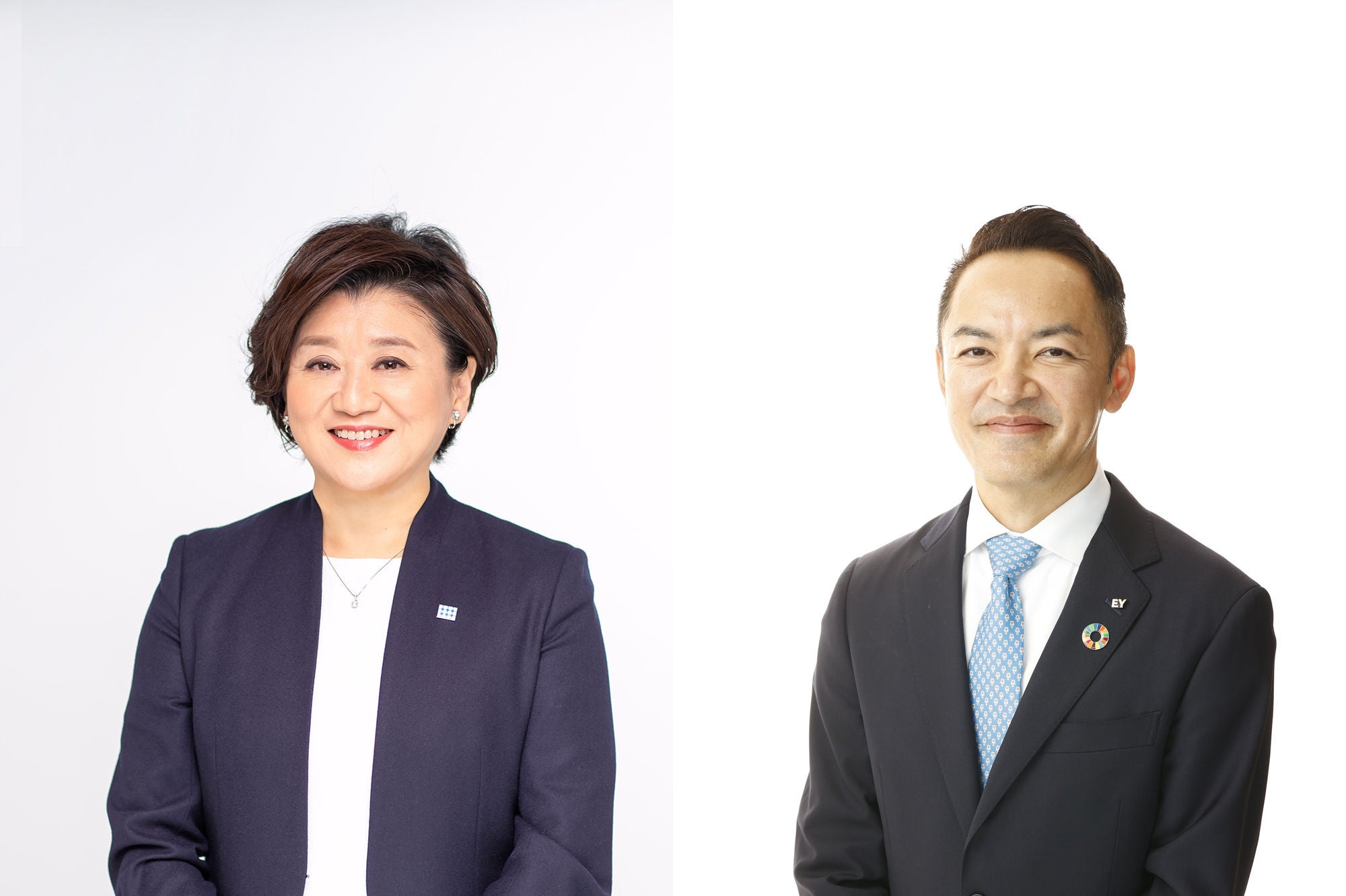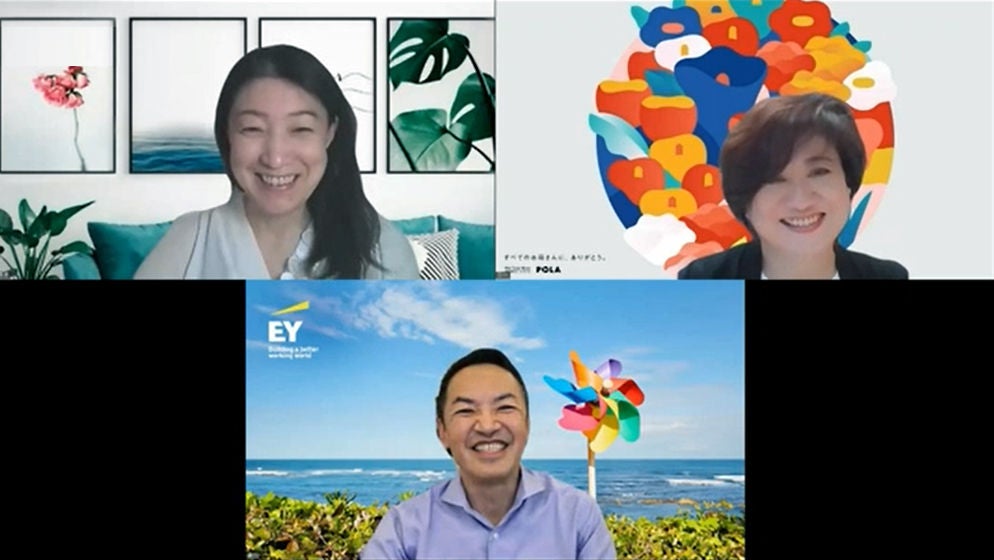EY refers to the global organization, and may refer to one or more, of the member firms of Ernst & Young Global Limited, each of which is a separate legal entity. Ernst & Young Global Limited, a UK company limited by guarantee, does not provide services to clients.

Overcoming gender and minority barriers
Summary
- Awareness of gender and minorities, the courage to be authentic, and acceptance of others is key.
- The concept of authentic leadership is taking root in many countries.
- Aim to be an upstander who can speak up and stand up for others.
With the EY purpose of Building a better working world, we do business with a focus on the actions of our members. Moriaki Kida, EY Japan Chairperson & CEO, participated in a discussion at the invitation of Miki Oikawa, CEO of POLA Inc., who is working to develop a workplace that is inclusive and psychologically safe. This was facilitated by Tsukiko Tsukahara, President of Kaleidist K.K., which specializes in advising government organizations, companies and university research institutes about diversity and inclusion (D&I).
The challenge of revealing ordinary emotions and uncertainties
EY has defined its purpose, and the corporate philosophy of POLA Inc., where Miki Oikawa serves as CEO, is “Science. Art. Love. Creating everlasting happiness among people and communities wishing for beauty and health.” There are many similarities in the aspirations of EY and POLA.
Tsukahara: In today’s discussion, we will hear from Miki Oikawa from POLA about the challenges she experienced as a woman, and from Moriaki Kida about the discrimination he faced because of his sexuality. We will also consider specific actions for D&I that can be taken both as individuals and as managers. I’d like to start by asking each of you about what inspired your approach and your path to self-acceptance.
Oikawa: In my case, the issue of gender is omnipresent but just before and after giving birth I first felt unable to fully assert myself. I had no choice but to work shorter hours but being unable to work like everyone else was discouraging and made me lose confidence. Confronted with the issues of my gender and of being a mother, I withdrew into my shell.
Another example is that even when I became a manager and attended meetings as an executive, I was continuously referred to as the “sole woman,” especially outside the company. I was uncomfortable with this, and I felt confused as to whether my statements were my own personal opinions or a representative voice for all women. I realized that I was searching for an ideal response on behalf of others.
Tsukahara: What gave you the strength to break away from this?
Oikawa: More than strength, I had the revelation that it was important to assert that I am an individual, more so than being the “sole woman.” I was in my early 40s at the time and was exhibiting the authentic and typical emotions and uncertainties of working people around my age. When I did that, there was always someone who would take the effort to listen to my thoughts and opinions as someone coming from the minority. Looking back, I think that the combination of my decision to be authentic and the acceptance of those around me enabled me to overcome these barriers.
Tsukahara: Kida-san, what has been your experience?
Kida: My career spans 25 years, but I have been fully self-aware for less than a decade. As a gay man and an Asian, growing up and working outside Japan, I was part of a double minority for a very long time. Whenever I attended a meeting or worked as part of a team, I constantly worried if I was being accepted by the people around me. I progressed in my career but was always considering the perspective of those in the majority.
That changed six years ago when I returned to Japan. Suddenly, I was no longer part of an Asian minority and, in addition, others listened to my opinions because I am a man. The culture shock was huge. I also realized that having others listen to my opinion was probably a privilege that came from being part of the majority.
Tsukahara: How much did your position change simply because you were working with other Japanese people?
Kida: The attributes of the majority and the minority will change, depending on the relative position of whoever defines them. I believe that everyone can simultaneously be a member of both the majority and the minority. However, those in the majority rarely have an awareness of this, so they don’t have the opportunity to realize that they are privileged and are likely unaware of their assertions. Minorities, on the other hand, feel the existence of that privilege every day.

Upper left: Tsukiko Tsukahara, President of Kaleidist K.K.
Upper right: Miki Oikawa, CEO of POLA Inc.
Lower: Moriaki Kida, Chairperson & CEO of EY Japan
Those in the majority should take the initiative to be authentic
Tsukahara: Oikawa-san spoke of the importance of authenticity. Are there any precautions to take when you are revealing information about yourself or asking someone else to do that?
Kida: In other countries, the concept of authentic leadership - based on being yourself - is taking root. If you don’t reveal your approach, experience or minority attributes to others, this may create an environment where the people around you, especially those with less privilege, feel unable to disclose their own attributes.
From personal experience, showing interest in a way that connects to personal feelings or beliefs can be awkward, but seeking an opinion on social issues such as the recognition of same-sex marriage is an appropriate way to display curiosity. For example, someone brought up an LGBT-related topic and asked my opinion about the recognition of same-sex marriage — showing this type of curiosity helped me feel comfortable about being myself. Building upon dialogue like this brought us closer together. In both cases, I think that when those with majority attributes disclose their own backgrounds first, this fosters an environment for others to also be true to themselves. However, if you start by asserting your own values, this can make it hard for those with differing values to speak up. We need to be conscious of that. Oikawa: One thing we should probably remember is that you can’t instantly create the highest level of psychologically safety. We have to slowly reveal something of ourselves, step by step. Even if we choose to reveal something, it’s an imposition if the other person doesn’t want to know about it. Leaders should be aware of this. We need honest dialogue, revealing our own weaknesses and uncertainties while communicating that the other person’s opinions are important. Without this, we will only see an increase in the number of people who outwardly align their ideas with their supervisor but who inwardly are not being their true self.
Tsukahara: Kida-san, you mentioned the privilege of the majority. If it is hard for them to gain this awareness on their own, how could we help them with this?
Kida: From research, we know the factors that highlight the situation for those with privilege. When you find it easy to reach a consensus with your work colleagues, or you make progress without the need for detailed explanation, you should presume that you benefit from privilege. Believing that you earned your status – your current privilege – solely by working hard is one characteristic of the privileged. However, it is a real challenge to be aware of something you haven’t noticed, so companies need to introduce training. EY launched this training last year.
Oikawa: If employees who are not at management level are to help the majority understand their privilege, solidarity is the only way forward. Collate the opinions of the minority so they have material and meaningful influence. And more than anything else, don't isolate your minority attributes just inside yourself. Create a network of peers and team up to break down barriers. That is what’s important. I’ve been told many times “That’s your personal opinion, right?” when I spoke as an individual.
The courage of the minority and the words of Rev. Dr. Martin Luther King, Jr.
Tsukahara: Are there any experience or story that you are inspired in your respective careers?
Oikawa: This is an anecdote about our company in the late 1930s. Despite being a cosmetics company, the salesforce was all men. Then, a 27-year-old woman who had no knowledge of cosmetics nor sales experience saw a poster saying “Salesmen wanted” and asked, “Can a woman apply?” This eventually led to the “POLA Ladies.” The courage of this woman who opened the door is wonderful, but I especially appreciate that the men didn’t turn her away and accepted her.
Anyone who has authority within an organization or business unit can declare their intent to work with someone. That’s why I want to stress to leaders that if you even suspect that someone is not being fully authentic, or might be holding back their own opinion, it is imperative for you as a leader to open a dialogue and change that. It is the responsibility of leaders to create psychological safety within an organization.
Kida: Rev. Dr. Martin Luther King, Jr., who was famous as a leader of the civil rights movement in the US, said this: “In the end, we will remember not the words of our enemies, but the silence of our friends.” I always consider the meaning of this in my role.
A new standard and increasingly global concept is “to be an upstander.” There doesn’t seem to be a fitting Japanese translation for this, but it captures the idea of “taking a stand and speaking up with integrity when something that is wrong.” This is a contrast to “bystander,” as a person who observes but doesn’t act. As Dr. King said, I want to be a person who speaks up on behalf of someone in the minority whenever I see an unfair situation.
Tsukahara: What measures can individuals and organizations take to cultivate minds more accepting of differences such as gender and sexuality?
Oikawa: I think that a company is a microcosm of society, comprising people of all ages, genders and ideologies. This is why it is crucial for companies to promote and reinforce D&I in the pursuit of a better society on a small scale ie within the company, while aiming for a better society overall. If someone is unable to demonstrate their ability within a company, I suspect that there is an underlying problem in the company’s structure or internal culture and there needs to be a push for substantive dialogue.
Awareness is equally important. I gained all kinds of awareness today by listening to Kida-san and Tsukahara-san, and I would like to link this to policies and solutions to resolve issues at POLA.
Kida: EY Japan is forming partnerships using pro bono internal programs with various companies, NPOs, colleges, and more. We will continue our activities by considering how to move society in a better direction overall but starting at the level of companies, which are microcosms of society.
t is imperative that we all participate in activities for other communities which do not share our own attributes, such as LGBT+ and gender. As Miki Oikawa said, the team that you belong to is the most important one, so we hope that you will take the initiative to reflect, take action, and be an upstander in developing psychological safety.
Summary
As society recognizes initiatives for Diversity, Equity and Inclusiveness (DE&I), the key takeaways from this discussion were the values of “awareness” and “curiosity” toward individuals with varying attributes and characteristics. It is important that the majority with unconscious privilege becomes aware of these values, and that leaders use their position to actively display them within the organization.



